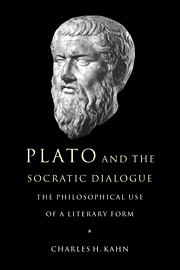Book contents
- Frontmatter
- Contents
- Preface
- List of abbreviations
- 1 Sōkratikoi logoi: the literary and intellectual background of Plato's work
- 2 The interpretation of Plato
- 3 Socrates
- 4 Plato as a minor Socratic: Ion and Hippias Minor
- 5 Gorgias: Plato's manifesto for philosophy
- 6 The priority of definition: from Laches to Meno
- 7 Charmides and the search for beneficial knowledge
- 8 Protagoras: virtue as knowledge
- 9 The object of love
- 10 The emergence of dialectic
- 11 The presentation of the Forms
- 12 Phaedrus and the limits of writing
- Appendix On Xenophon's use of Platonic texts
- Bibliography
- Indexes
12 - Phaedrus and the limits of writing
Published online by Cambridge University Press: 02 November 2009
- Frontmatter
- Contents
- Preface
- List of abbreviations
- 1 Sōkratikoi logoi: the literary and intellectual background of Plato's work
- 2 The interpretation of Plato
- 3 Socrates
- 4 Plato as a minor Socratic: Ion and Hippias Minor
- 5 Gorgias: Plato's manifesto for philosophy
- 6 The priority of definition: from Laches to Meno
- 7 Charmides and the search for beneficial knowledge
- 8 Protagoras: virtue as knowledge
- 9 The object of love
- 10 The emergence of dialectic
- 11 The presentation of the Forms
- 12 Phaedrus and the limits of writing
- Appendix On Xenophon's use of Platonic texts
- Bibliography
- Indexes
Summary
TWO INTERPRETATIONS OF THE PHAEDRUS
The Phaedrus is, in a sense, the last Socratic dialogue. Not that Socrates disappears from Plato's work; the continuity of literary form is preserved by Socrates' presence in every dialogue except the Laws. He plays an important and unprecedented role in the Parmenides; he is the principal speaker in the Theaetetus and also, for one last time, in the Philebus. The Theaetetus even imitates the formal pattern of an aporetic dialogue. But in comparison with earlier dialogues the portrayal of Socrates in the Theaetetus is rather wooden and didactic, and even more so in the Philebus. The Phaedrus is the latest work in which Plato's talent as a writer is displayed in its full intensity. It is also the work in which Plato reflects most explicitly on the role of writing in philosophy. So it is fitting that we conclude this study of Plato as author of Socratic dialogues with a consideration of the Phaedrus.
This dialogue occupies a unique place among Plato's literary masterpieces. It does not have the dramatic power of the Protagoras, Symposium, and Phaedo, or the magnificent argumentative structure of the Republic. But in the Phaedrus Plato shows himself the master of a new kind of art. First a pastoral dialogue with the charming picture of Socrates wading through a cool stream on a hot day, stretching himself on the grass in a shady spot near a shrine to the nymphs, with the music of cicadas all around in the noonday heat. This romantic description of nature is unparalleled in Plato, and rare in Greek literature.
Information
- Type
- Chapter
- Information
- Plato and the Socratic DialogueThe Philosophical Use of a Literary Form, pp. 371 - 392Publisher: Cambridge University PressPrint publication year: 1997
